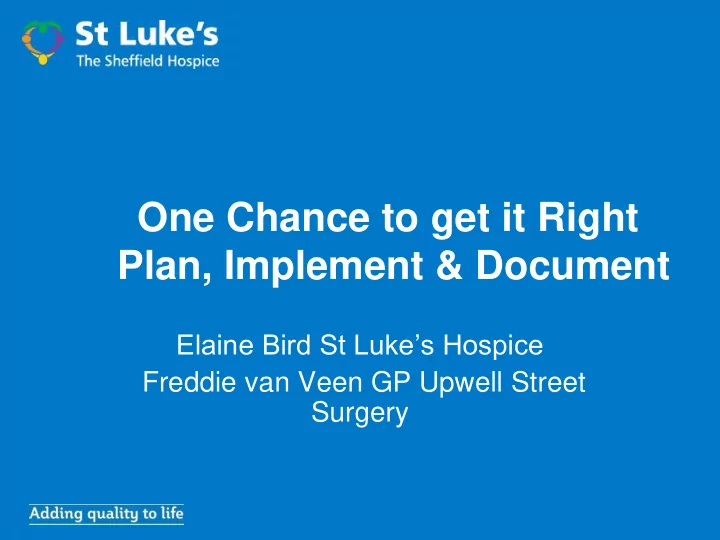

One Chance to get it Right Plan, Implement & Document Elaine Bird St Luke’s Hospice Freddie van Veen GP Upwell Street Surgery
Aim • To gain confidence in initiating end of life discussions at the appropriate time. • How & where to document an advance care plan.
Who / What needs considering when formulating an ACP? • The Individual, their wishes. • Family, NOK, those closest to them • The ‘Nursing’ team • GP & out of hours GP • The Mental Capacity Act
Discuss what needs to be incorporated in individual care plans • Reflects individual wishes. • Summary of the communication. • Needs of families are actively explored. • Supported by clear medical documentation to guide decision making
Leadership • Care staff are key for co-ordinating and planning care. • Care staff can act as advocates. • Shared leadership where everyone can contribute to the leadership process.
Mental Capacity Act 2005 • A presumption of capacity- every adult has the right to make their own decisions • People must be given all appropriate help & information
Best Interest Decisions • Anything done for or on behalf of people without capacity MUST be in their best interest • Least restrictive intervention to protect their basics rights and freedom • That individuals must retain the right to make what might be seen as eccentric or unwise decisions.
Survival rates over 42 months • longitudinal study of elderly people admitted to residential and nursing homes(25000 people in 18 health authorities starting in 1995) – How many died within first month? 7% – How many died within 3 months in nursing home beds? 30% – How many died after 3 ½ yrs? 78% PSSRU,PSI 1 November 2000, A. Bebbington er al, Personal Social Services Research Unit , University of Kent at Canterbury
Stan, 88yrs, has recently been admitted to your care home PMH CCF, hypertension, renal failure, history of falls and loss of weight. He has had several hospital admissions for recurrent chest infections. His wife died 4 years ago following a short illness. Both his children are grown up, working with their own children. They feel guilty that dad has been admitted to a care home
• Would you be surprised if Stan died in the next year?
Discussions for initial Care planning • What information do you require from Stan? • What information do you require from Stan’s family? • What medical information do you require to support advance care planning?
Development of his Advance Care Plan • How /where would you document this information? • Involve his GP: what could you ask GP to do?
Deterioration potential end of life Stan’s overall condition begins to deteriorate • Increase breathlessness on minimal exertion • Increasing leg oedema • Decreasing appetite • Requesting longer periods of time in bed
What needs to happen next? • Initiate discussions with Stan & family: • Re-visit original discussions and wishes, • Inform them how you can support care in the home. • GP review • Consider pre-emptive prescribing
Core principles for delivery of end of life care • Maintain dignity • Identify and respect individual preferences • Provide information and support families /carers • Provide care after death.
Dame Cicely Saunders. • You matter because you are you. You matter to the last moment of your life and we will do all we can, not only to help you die peacefully, but to live until you die.’
Recommend
More recommend